
Arnold Joseph Toynbee was an English historian, a philosopher of history, an author of numerous books and a research professor of international history at the London School of Economics and King's College London. From 1918 to 1950, Toynbee was considered a leading specialist on international affairs; from 1929 to 1956 he was the Director of Studies at Chatham House, in which position he also produced 34 volumes of the Survey of International Affairs, a "bible" for international specialists in Britain.

Samuel Augustus Barnett was a Church of England cleric and social reformer who was particularly associated with the establishment of the first university settlement, Toynbee Hall, in east London in 1884. He is often referred to as Canon Barnett, having served as Canon of Westminster Abbey from 1906 until death.

Arnold Toynbee was an English economic historian also noted for his social commitment and desire to improve the living conditions of the working classes.

Regent Park is a neighbourhood located in downtown Toronto, Ontario built in the late 1940s as a public housing project managed by Toronto Community Housing. It sits on what used to be a significant part of the Cabbagetown neighbourhood and is bounded by Gerrard Street East to the north, River Street to the east, Shuter Street to the south and Parliament Street to the west. Regent Park's residential dwellings, prior to the ongoing redevelopment, were entirely social housing and covered all of the 69 acres (280,000 m2) which comprise the community. The original neighbourhood was razed in the process of creating Regent Park. The nickname Cabbagetown is now applied to the remaining historical, area north and west of the housing project, which has experienced considerable gentrification since the 1960s and 1970s.
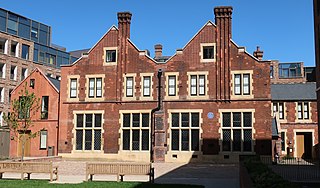
Toynbee Hall is a charitable institution that works to address the causes and impacts of poverty in the East End of London and elsewhere. Established in 1884, it is based in Commercial Street, Spitalfields, and was the first university-affiliated institution of the worldwide settlement movement—a reformist social agenda that strove to get the rich and poor to live more closely together in an interdependent community. It was founded by Henrietta and Samuel Barnett in the economically depressed East End, and was named in memory of their friend and fellow reformer, Oxford historian Arnold Toynbee, who had died the previous year.

Seneca College of Applied Arts and Technology, branded as Seneca Polytechnic since 2023, is a multi-campus public college in the Greater Toronto Area and Peterborough, Ontario, Canada. It offers full-time and part-time programs at the baccalaureate, diploma, certificate, and graduate levels attended primarily by international students, from whom it draws 80 per cent of its tuition revenue. Seneca Polytechnic has Canada's largest enrolment of international students, with 9,318 enrolled in 2020-2021.

Dame Henrietta Octavia Weston Barnett, DBE was an English social reformer, educationist, and author. She and her husband, Samuel Augustus Barnett, founded the first "University Settlement" at Toynbee Hall in 1884. They also worked to establish the model Hampstead Garden Suburb in the early 20th century.
The settlement movement was a reformist social movement that began in the 1880s and peaked around the 1920s in the United Kingdom and the United States. Its goal was to bring the rich and the poor of society together in both physical proximity and social connection. Its main object was the establishment of "settlement houses" in poor urban areas, in which volunteer middle-class "settlement workers" would live, hoping to share knowledge and culture with, and alleviate the poverty of, their low-income neighbors. The settlement houses provided services such as daycare, English classes, and healthcare to improve the lives of the poor in these areas. The settlement movement also spawned educational/reform movements. Both in the UK and the US settlement workers worked to develop a unique activist form of sociology known as Settlement Sociology. This science of social reform movement is neglected in the history of sociology in favor of a teaching-, theory- and research university–based model.
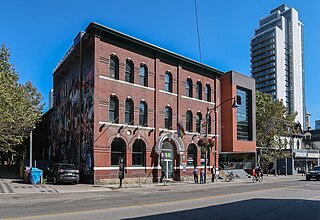
The 519, formerly known as The 519 Church Street Community Centre, is an agency by the City of Toronto. A Canadian charitable, non-profit organization, it operates a community centre in the Church and Wellesley neighbourhood of Toronto, Ontario, Canada. The 519 serves both its local neighbourhood and the broader lesbian, gay, bisexual and transgender (LGBT) communities in the Toronto area. The 519 defines its local neighbourhood by a catchment area that spans from Bloor Street to the north to Gerrard Street to the south, and from Bay Street in the west to Parliament Street in the east.
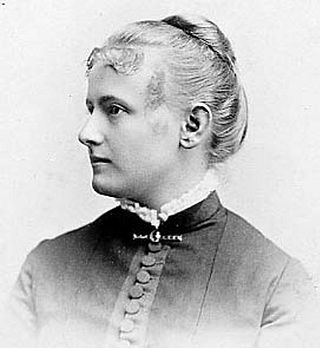
Julia Vida Dutton Scudder (1861–1954) was an American educator, writer, and welfare activist in the social gospel movement.
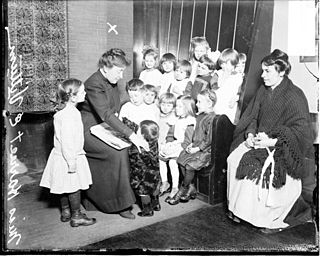
The Northwestern University Settlement House is an Arts and Crafts style house located at 1400 West Augusta Boulevard in Chicago, Illinois, United States. The Settlement Association was founded in 1891 by Northwestern University to provide resources to the poor and new immigrants to the West Town neighborhood. The actual Settlement House structure was built in 1901 by Pond & Pond. It was designated a Chicago Landmark on December 1, 1993.
West Neighbourhood House is a multi-service neighbourhood centre serving west downtown Toronto, Ontario, Canada since 1912. The non-profit charitable organization provides a wide range of programs to all age groups in downtown west Toronto. St. Christopher House integrates community development approaches with direct delivery of social services. The community served by St. Christopher House includes the diverse immigrant and mixed income neighbourhoods of Trinity Bellwoods, Niagara, Palmerston/Little Italy, Little Portugal, Dufferin Grove, Parkdale, Liberty-Exhibition and Roncesvalles.

Oxford House in Bethnal Green, East London, was established in September 1884 as one of the first "settlements" by Oxford University as a High-Anglican Church of England counterpart to Toynbee Hall, established around the same time at Whitechapel.
Social work as a profession dates back to years ago, with the first social welfare agencies appearing in urban areas in the 1800s. It has its roots in the attempts of society at large to deal with the problem of poverty and inequality. Social work is intricately linked with the idea of charity work, but must be understood in broader terms. The concept of charity goes back to ancient times, and the practice of providing for the poor has roots in all major world religions.
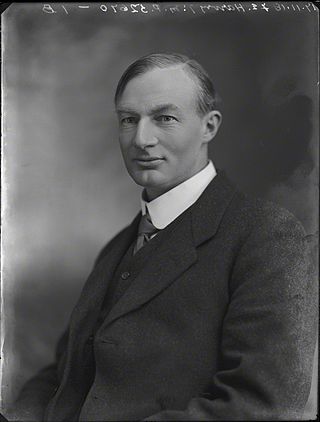
Thomas Edmund Harvey, generally known as Ted or Edmund Harvey, was an English museum curator, social reformer and politician. He sat in Parliament, first as a Liberal and later as an Independent Progressive. He was also a prolific writer on Christianity and the role and history of the Society of Friends.

Julia Schoenfeld was a Jewish-American social worker, writer, and activist. During the period of her settlement work, Schoenfeld became interested in recreation for working girls, a subject on which she became a recognized authority. Her investigation of public dance halls in New York City, undertaken in 1908 while she was secretary of the Committee on the Amusement Resources of Working Girls, was the basis for the model New York City ordinance regulating dance halls. Later, as secretary of the Playground and Recreation Association of America, she conducted dance hall investigations in Boston, Massachusetts, St. Joseph, Missouri, Johnstown, Pennsylvania, and Pittsburgh, Pennsylvania.

Browning Hall, properly The Robert Browning Settlement, was a social settlement established in Walworth, London, in 1895, one of a number of such 'settlements' arising out of the settlement movement and the university extension movement. It provided a range of social services to the poor of its deprived area, and provided accommodation enabling relatively well-educated people to live amongst the people with whom they worked.

Helen Gladstone was a British educationist, vice-principal at Newnham College in Cambridge, and co-founder of the Women's University Settlement.

Blackfriars Settlement charitable organization in the UK established to improve the well-being of disadvantaged people. It was originally established as the Women's University Settlement in 1887, and focused especially on the needs of women and children. It was part of the settlement movement promoted by Rev Samuel Barnett who prompted young people with university educations to settle in the worst areas of poverty. The Women's Library has an archival collection of documents related to the group.
Margaret Sewell (1852–1937) was an English educator who was Warden of the Women's University Settlement. She was a pioneer advocate of social work.















